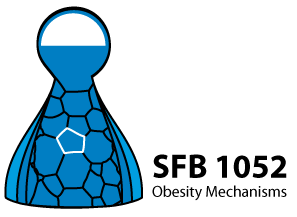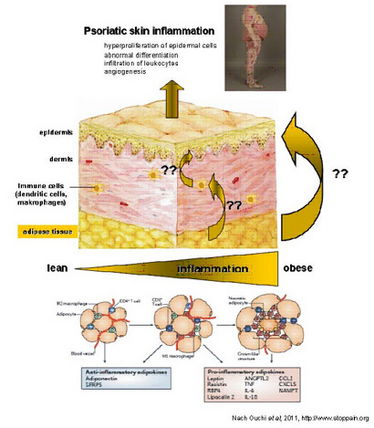B5 - Psoriasis as a model to study adipokine effects on inflammation
This project has been funded by the DFG from 2013 to 2016.
Psoriasis is a common, chronic inflammatory skin disease, leading to massive hyperplasia of epidermal keratinocytes and to disabling arthritis. Numerous studies show that patients suffering from psoriasis are at significant risk to develop several co-morbidities like metabolic syndrome. Several studies observed a correlation between psoriasis and obesity. Moreover, the risk of psoriasis is directly related to elevated BMI. Adipokines, cytokines produced by the adipose tissue, are thought to link metabolism and immunity. However, it is not known how these adipokines are involved mechanistically in the pathogenesis of psoriatic (auto)immune inflammation.
Based on our previous work the project focuses on the adipokine vaspin, a serine protease inhibitor, to test 1) whether vaspin via the inhibition of serine proteases modulates the generation of “immunostimulatory” peptides and thus affects psoriatic (auto)immune inflammation 2) to examine the regulation of vaspin expression in skin 3) to study the effects of vaspin, as a potential therapeutic target, on psoriatic inflammation in an animal model. Finally, we want to understand whether and by which mechanisms obesity-associated factors and processes affect (auto)immune inflammation such as psoriatic skin inflammation.
Figure 1. Interaction Obesity-Psoriasis. The development of obesity is associated with the influx of inflammatory cells into the fat tissue resulting in the generation of a proinflammatory environment. How can obesity-associated factors like adipokines modulate via a direct effect on epidermal cells or indirect via the modulation of the function of immune cells within the skin the initiation and perpetuation of an autoimmune reaction like psoriatic skin inflammation?
Herbert D, Franz S, Popkova Y, Anderegg U, Schiller J, Schwede K, Lorz A, Simon JC, Saalbach A. High fat diet exacerbates early psoriatic skin inflammation independent of obesity: Saturated fatty acids as key players. J Invest Dermatol. 2018 Mar 29. pii: S0022-202X(18)31858-X.
Ulbricht D, Oertwig K, Arnsburg K, Saalbach A, Pippel J, Sträter N, Heiker JT. Basic residues of ß-sheet a contribute to heparin binding and activation of vaspin (serpin A12). J Biol Chem. 2017;292:994-1004.
Stelzner K, Herbert D, Popkova Y, Lorz A, Schiller J, Gericke M, Klöting N, Blüher M, Franz S, Simon JC , Saalbach A. Free fatty acids sensitize dendritic cells to amplify TH1/TH17-immune responses. Eur J Immunol. 2016;46:2043-53.
Saalbach A, Tremel J, Herbert D, Schwede K, Wandel E, Schirmer C, Anderegg U, Beck-Sickinger AG, Heiker JT, Schultz S, Magin T, Simon JC. Anti-inflammatory action of keratinocyte-derived vaspin: relevance for the pathogenesis of psoriasis. Am J Pathol. 2016;186:539-51.
Schunter JA, Löffler D, Wiesner T, Kovacs P, Badenhoop K, Aust G, Tönjes A, Müller P, Baber R, Simon JC, Führer D, Pfäffle RW, Thiery J, Stumvoll M, Kiess W, Kratzsch J, Körner A. A novel FoxD3 variant is associated with vitiligo and elevated thyroid auto-antibodies. J Clin Endocrinol Metab. 2015;100:E1335-42.
PROJECT TEAM
| Dr. habil. Anja Saalbach Leipzig University Faculty of Medicine Department of Dermatology, Venerology and Allergology Johannisallee 30 04103 Leipzig e-mail: anja.saalbach@medizin.uni-leipzig.de Phone: 0341 / 97-25880 |
Prof. Dr. Jan-Christoph Simon |


